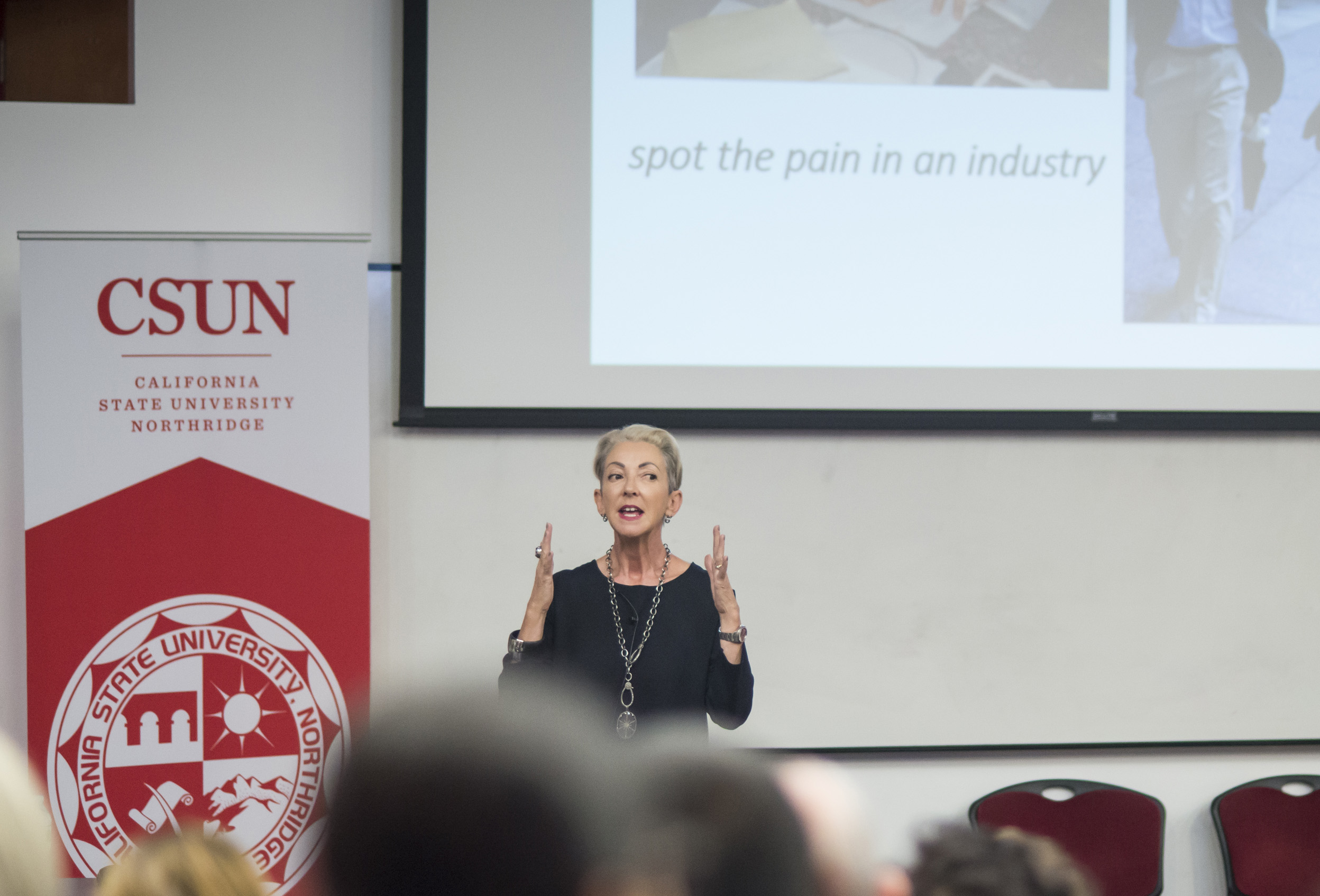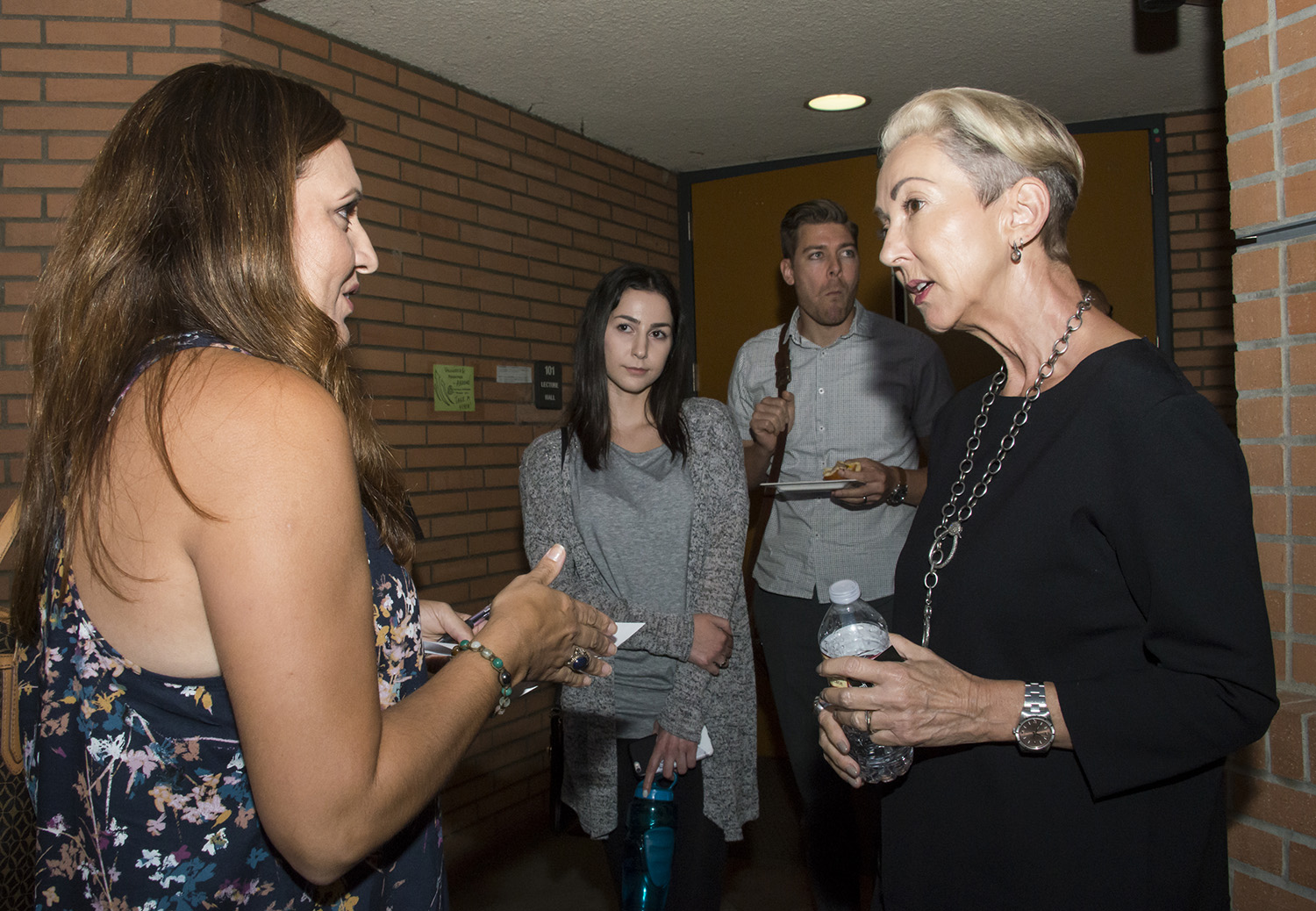Skincare Entrepreneur Teaches the Value of Determination at CSUN Lecture
“Don’t do what everyone else is doing — do what they’re not doing” was the message that innovative entrepreneur Jane Wurwand shared with business students and budding entrepreneurs during her recent lecture at California State University, Northridge. Wurwand, founder of the skincare company Dermalogica and The International Dermal Institute, shared her story during her speech, “Changing the World with Our Bare Hands,” on Sept. 27 at CSUN’s Charles H. Noski Auditorium.
Wurwand shared her background with the audience, including her first job in a salon at age 13, her father’s untimely death and her mother’s work ethic in raising her and her siblings alone.
“My mom set a work ethic example for us,” she said. “That’s when she gave me five words that changed my life: ‘Learn how to do something.’”
Wurwand, who is also a U.S. Presidential Ambassador for Global Entrepreneurship, said she believes that determination and follow-through are essential for entrepreneurs.
“You need to figure out the opportunity in any field — you need to spot the pain,” she said. Wurwand and her husband, Raymond, emigrated from the United Kingdom to the United States in 1983, and as Wurwand worked as an esthetician, the “pain” she quickly spotted in salons was a lack of skincare training beyond the basic skill set needed for a cosmetology/esthetics license.
To help fill that void, Wurwand and her husband opened The International Dermal Institute in 1983 with just 17 students, creating a business that allowed estheticians with licenses to upgrade their skills so they could build their own salon businesses. The institute received an excellent response, especially from entrepreneurial-minded women.
“The skincare profession puts more women into their own businesses than any other industry in the world,” Wurwand explained. “Women own 61 percent of salon industry businesses today, and according to the U.S. Bureau of Labor Statistics, there’s estimated to be a 40 percent job growth in the salon industry between now and 2022.”
Wurwand soon discovered another source of “pain,” she said: Professional-level domestic products weren’t available.
“There were brands in the drugstore and department store, but there wasn’t anything for skincare in the salon that wasn’t imported and expensive,” Wurwand said.
This realization led Wurwand to find a cosmetic chemist to develop her institute’s own skincare products free of common skin irritants, including lanolin, SD alcohol, mineral oil, and artificial colors and fragrances. Dermalogica officially launched in 1986, earning an astonishing $1 million in its first full year. By 2014, Dermalogica had earned nearly $240 million, and the brand was sold to Unilever in 2015.
One of the biggest surprises to Wurwand was how loyal her customers were to her brand. “I found that it had developed into a ‘campfire’ for estheticians to exchange stories and tips,” she said of her customer base. “They started calling themselves a ‘tribe.’”
At CSUN, Wurwand challenged her audience to pursue their dreams, regardless of their backgrounds.
“You can see challenges as baggage, or you can see them as life lessons to propel us where we’re going. … There is no shortage of good ideas; there is a shortage of immaculate execution,” she said. “Bring it big, and be emotional about your business. If you’re pursuing only money, it will elude you.”
Alumna Ellen Nathan ’09 (Education), who now owns her own licensed hearing aid dispensary, found inspiration in Wurwand’s advice. “I know of a huge gap in my industry, and after tonight, I think I’m going to pursue the opportunity I see,” she said.
“It was truly inspirational — every woman who thinks about having an enterprise one day should come listen to her,” added Sigalit Ronen, professor of organizational behavior at CSUN’s David Nazarian College of Business and Economics, whose Management 454 class attended the lecture. “The most important point for my class was that you don’t have to come from a certain background or already have a set of skills to create your own business, but you do have to have the courage to pursue your goals.”
MBA student Ali Habibi was impressed by the creation of a culture within Wurwand’s business. “We can read about people who can bring that about, but it takes a special person to actually do it,” he said. “Listening to her talk about her successful business was really inspirational.”



 experience
experience